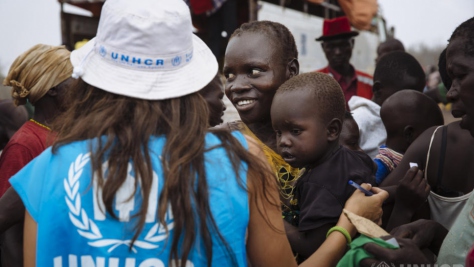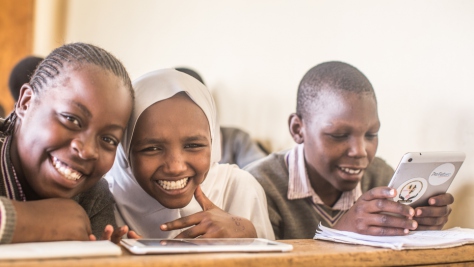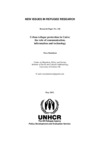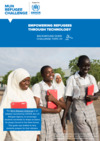Keynote Address by Mrs. Sadako Ogata, United Nations High Commissioner for Refugees, for Microsoft Tech-Ed 2000 Europe, Amsterdam, 4 July 2000
technology
information technology
UNHCR's Mission
The Plight of Refugees
A New Partnership
Making a Difference for Refugees
Ladies and Gentlemen,
I am delighted to be with you in Amsterdam for Microsoft Tech-Ed 2000 Europe. I would like to thank Microsoft for the hand of partnership it has extended to UNHCR and for the opportunity to speak to you this morning.
The excitement of being here at the leading edge of the information technology revolution is tangible. You are creating extraordinary tools that are transforming the world. Communications and the flow of information have become virtually instantaneous. Computers, software applications and the Internet are dramatically changing the way people learn and teach, work, treat disease and even interact socially.
We are undeniably living in a remarkable period in human history. But let us stop and consider, from a global perspective, how broad and deep these changes have been. Half of the world's people have never made or received a telephone call. More than half - over three billion people - live on less than $2 per day. Computers and the Internet are still available only to a privileged few.
Most refugees are born on the wrong side of this yawning digital divide. Others were thrown there. Some left behind lives where, like you and I, they took the conveniences of modern life for granted. A refugee's immediate concern is to escape from persecution, violent civil conflict or war - to survive. For the overwhelming majority, the Internet, wireless communication and the handheld devices that are your daily bread are as real as science fiction.
My aim today is to give you a sense of the linkages between UNHCR's humanitarian work and your high-tech world. My hope is that you will be inspired to join us in a partnership to help empower some of the world's most disadvantaged and vulnerable people.
UNHCR's Mission
Let me introduce you to UNHCR, the United Nations refugee agency. Our work began in 1950. In those days, we dealt mostly with individuals fleeing Communist rule in Eastern Europe. UNHCR was established as a temporary organization, with a staff of twenty-three, a $5 million budget and projected three year life span.
We now have some 5000 people working in 120 countries around the world. Our annual budget has exceeded $1 billion every year since 1992. Twenty years ago, we had 2.5 million refugees under our care. Today, we are protecting and seeking solutions for 22 million refugees and uprooted people world-wide. UNHCR marks its fiftieth anniversary in December this year. But our expansion and longevity are no cause for celebration, as they might be in the business world. UNHCR remains necessary and has grown because persecution and conflict force ever-greater numbers of people to flee their homes. So in our anniversary year, we are not celebrating UNHCR but rather refugees - their courage, their determination and their capacity for survival against all odds.
UNHCR leads and coordinates international action for refugees. During emergencies, our first priority is to ensure that people on the move can reach safety. UNHCR workers put themselves on the line to protect refugees in flight from danger and abuse, including the targeting of women and young girls for sexual violence and exploitation. We work with our partners to ensure that refugees have enough water, food and shelter and access to such basic facilities as latrines and health clinics.
When people move in massive numbers, huge logistical means must be mobilized to help them survive. Many of you will remember the airlift that kept the city of Sarajevo alive for three years during the war in Bosnia. You may also recall another airlift in 1994 that brought emergency relief to a cholera-stricken population of one million Rwandans camped around the city of Goma in the former Zaire.
Last year, the international community mounted a humanitarian operation of unprecedented complexity when 850,000 refugees streamed out of Kosovo and, a few months later, flooded back home with equal speed. But the Kosovo experience was far from typical. Most of UNHCR's work takes place away from the international spotlight and media attention. In these "forgotten" emergencies, UNHCR and its partners struggle against incredible odds and with resources that are shockingly small compared to the dire humanitarian needs.
Doing our job means being with the refugees in some of the most isolated and dangerous places on Earth. Many of my colleagues in the field live with daily discomforts and hardships that are appalling. They leave behind families and endure long separations during assignments that may last for two years or more. And they face an increasing threat of violence by local actors who do not see our role as purely humanitarian or who believe that the murder of an aid worker will send a political message.
The Plight of Refugees
Who are refugees? They are ordinary people in extraordinary circumstances. Refugees are forced to run for their lives, abandoning their homes, land and virtually everything else they possess in this world. Nearly half are children, some of whom have lost their families to violence, disease or starvation or have become separated in the chaos of flight.
Refugees face an uncertain welcome. The communities where refugees flee may be hostile, seeing them as a threat to social stability and jobs. Even where local people receive them with understanding and compassion, large refugee populations can rapidly test the limits of human solidarity by placing huge strains on public services, housing, agricultural land and the environment. People become refugees in one tragic moment, but they may remain refugees for many painful years. UNHCR's humanitarian programmes sustain refugee communities and help them build upon their own strengths to achieve a level of self-reliance. We try to ensure that refugee children get primary level schooling, but I am very sorry to say that millions have no chance to continue their education at the secondary level. For them, the idea of entering university is an unrealistic and distant dream.
Refugees have been torn from their past, and the path to the future is very uncertain. UNHCR works to achieve lasting solutions for refugees, by helping them go home when it is safe or by settling in another country. Finding solutions for refugees is never easy. Returning refugees may find only ruins where their homes once stood, while refugees starting new lives through resettlement must overcome their traumatic experiences and adapt to new languages, cultures and ways of life.
UNHCR's ultimate mission is to preserve a future for refugees. Human society suffers a great loss when refugee lives are wasted or when they are left to perish. Einstein was a refugee. Andy Grove, Intel Corporation's co-founder and Chairman, was a refugee. Among this gathering, without any doubt, are many former refugees and the children of refugees.
A New Partnership
Ladies and Gentlemen,
Protecting and assisting refugees requires partnerships and teamwork. The key players on the team are the refugees themselves, host communities, national and foreign government agencies, international and non-governmental organizations and, increasingly, business corporations. Our partnership with business is relatively new. In the past, our interaction was either purely commercial, as a purchaser of goods and services, or entirely charitable, as the recipient of corporate donations. We now seek real partnerships with responsible corporations based upon shared interests, commitments and values.
UNHCR seeks and business needs a more stable and peaceful world. Wherever refugees are fleeing, international capital has already taken flight. We enter the scene when things fall apart. We stay during the crisis period and try to preserve the basic building blocks of society - individuals, families and communities. We lay the first foundation stones for recovery, rehabilitation and reconciliation. Our success in stabilizing societies in crisis is a precondition for business to return. Equally, the return of business - jobs and the hope they bring - is crucial to building a durable peace. Here we see a very important convergence of interests.
But common interests are not enough. Partnerships also require personal commitment and a mutual respect for each other's strengths. That is why we see the Kosovar Refugee Registration Project as a model for UNHCR's partnerships with the corporate world. UNHCR's relationship is not simply with the Microsoft Corporation, but with the people of Microsoft. Microsoft employees around the world were moved by the images of human suffering being broadcast from the Balkans. They wanted to help.
We asked Microsoft to develop a solution for one of our most basic, yet vexing, operational challenges - refugee registration. Microsoft assembled a team of volunteers, secured the support of the William H. Gates Foundation and enlisted the help of Compaq, Hewlett-Packard, Canon, Kingston Technology, Securit World Ltd. and ScreenCheck B.V. The team quickly designed and developed a state-of-the-art Refugee Registration Kit.
Microsoft volunteers worked side-by-side with my UNHCR colleagues in Albania to field-test and deploy this new technology. We were all impressed by their great technical expertise and resourcefulness, and I believe the Microsoft people enjoyed linking their professional lives and their social concerns.
The Refugee Registration Kit is composed of a laptop computer, digital camera, identification card printer and other accessories. You may see this as a simple and logical combination of existing technologies. But you must understand that the basic UNHCR refugee registration kit still in use around the world - call it Version 0.1 - consists of pencils and paper.
Let me explain why registration is so important. Becoming a refugee is a dehumanizing experience. A refugee identity card can represent the first important step toward restoring an individual's sense of self. A computerized registration database also enables distraught people to locate missing family members, including lost children, with great speed.
For UNHCR, the registration database also allows us to develop a precise demographic profile of the refugee population, including the numbers and locations of separated children, isolated elderly people and other especially vulnerable persons. The result is more effective and efficient management, and the benefits flow to the refugees.
Microsoft has developed new registration software and created an updated version of the technology called Refugee Field Kit 2000. A Microsoft volunteer helped UNHCR field-test Refugee Field Kit 2000 in Senegal earlier this year, and we are now using the new kit in India to register and issue identity cards to some 15,000 urban refugees living around New Delhi.
Making a Difference for Refugees
The Tech-Ed 2000 Europe publicity brochure calls upon you to "play your part in shaping the future." I see one of your greatest challenges as making that future inclusive and accessible to all.
Globalization and integration on the technological plane are the forces driving your industry. I would like to call upon you to devote a portion of your enormous creativity and resources toward promoting a true globalization of concern and a meaningful integration of humanitarian values in the new world being created by information technology.
Let me give you four practical ideas how you can make a difference for refugees:
First, join us on the humanitarian frontlines. Use your special technological expertise to support our emergency operations in the field. Microsoft and UNHCR are discussing the creation of a volunteer "international technology corps" for this purpose.
Second, help us get the tools we need. Give us access to innovative information technology that will improve the lives of refugees and enhance the security of our people. UNHCR needs advanced technology adapted to the rigours of the field, where electricity supplies are irregular at best and exposure to the elements takes a heavy toll on equipment.
Third, help us create opportunity for refugees. Provide information technology support for education and skills training programmes and create jobs for refugees. UNHCR and Microsoft are already collaborating in a training initiative for refugees and displaced people in Croatia. Similar projects are possible in Turkey, Armenia, Azerbaijan, Georgia and Pakistan.
Fourth, help us tell refugee story. Lend your technical and "real world" marketing expertise to UNHCR's efforts to harness the Internet. We see the Internet as a tremendously powerful tool for building public support for refugees and raising funds for our humanitarian programmes.
All of us would agree that the information technology revolution has made our world smaller. We are looking for partners who can help make the world a little bigger for people whose horizon stops at the edge of a refugee camp and whose vision is limited to surviving another day.
I hope that you will join us.
Thank you.
Your search for « technology in UNHCr » matched 2103 results. Only the first 1,000 results are displayed. Displaying page 1 of 112 pages.
-

Gifts in Wills
... Leave a gift in your Will UNHCR works tirelessly to help millions of refugees whose lives have ... offered thousands of women refugees the opportunity to learn technology skills and IT knowledge. ...... -

Taking refuge in technology: communications practices in refugee camps and immigration detention. Linda Leung
2 Feb 2011 ... NEW ISSUES IN REFUGEE RESEARCH Research Paper No. 202 Taking refuge in technology: communication ... 1211 Geneva 2 Switzerland E-mail: hqpd00@unhcr.org Web Site: www.unhcr.org These papers ...... -

ProFuturo Foundation
... At the start of 2021, the ProFuturo Foundation partnered with UNHCR to help ... was implemented in 15 schools in Rwanda, including the provision of technology (such as computers, tablets, ...... -

Accountability
... UNHCR works systematically to identify and reduce risks of sexual exploitation, abuse and harassment, in all its operations. ... face to face engagement, mobile phone technology and call centres. ...... -

UNHCR uses drones to help displaced populations in Africa
21 Nov 2016 ... But in conflict-affected parts of Africa, versions of the technology are being used by humanitarian aid organizations like UNHCR, the UN Refugee Agency, to plan relief responses and save lives. ...... -

Urban refugee protection in Cairo: the role of communication, information and technology. Nora Danielson
25 May 2012 ... No. 236 Urban refugee protection in Cairo: the role of communication, information and technology Nora Danielson Centre on ... 2 Switzerland E-mail: hqpd00@unhcr.org Web Site: www.unhcr.org ...... -

Livelihood Programming in UNHCR: Operational Guidelines
24 May 2012 ... I Livelihood Programming in UNHCR: Operational Guidelines LiveLihood Programming in UnhCr: ... using GIS (Geographical Information System) technology, with the support of the Field Information ...... -

Empowering refugees through technology
27 Nov 2020 ... EMPOWERING REFUGEES THROUGH TECHNOLOGY The MUN Refugee Challenge is an initiative launched by UNHCR, the UN Refugee Agency, to ... Angelina Jolie Primary School in Kakuma Refugee Camp in Kenya. © ...... -

New Skype technology keeps UNHCR staff in touch
9 Dec 2010 ... communications software application to connect UNHCR field staff in remote regions with their colleagues, family and friends. The new technology, created under a landmark partnership between ......
